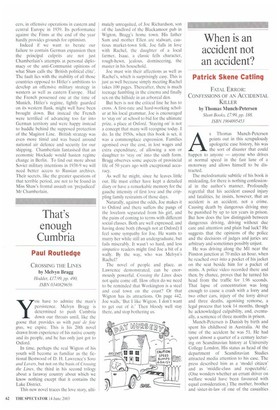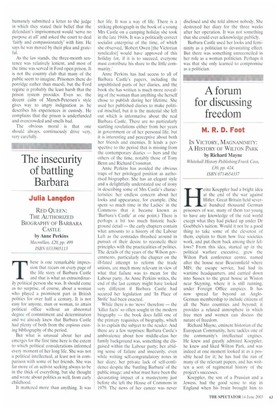When is an accident not an accident?
Patrick Skene Catling
FATAL ERROR: CONFESSIONS OF AN ACCIDENTAL KILLER by Thomas Munch-Petersen Short Books,17.99, pp. 188, ISBN 1904095453 As Thomas Munch-Petersen points out in this scrupulously apologetic case history, his was the sort of disaster that could happen to anyone — anyone who drives at normal speed in the fast lane of a motorway and allows himself to be distracted.
The melodramatic subtitle of his book is misleading, for there is nothing confessional in the author's manner. Profoundly regretful that his accident caused injury and fatalities, he insists, however, that an accident is an accident, not a crime. Causing death by dangerous driving may be punished by up to ten years in prison. But how does the law distinguish between dangerous driving, driving without due care and attention and plain bad luck? He suggests that the opinions of the police and the decisions of judges and juries are arbitrary and sometimes possibly unjust.
He was driving along the MI near the Pinxton junction at 70 miles an hour, when he reached over into a pocket of his jacket on the seat beside him for a packet of mints. A police video recorded there and then, by chance, proves that he turned his head from the traffic for 1.96 seconds. That lapse of concentration was long enough to cause a crash with a lorry and two other cars, injury of the lorry driver and three deaths, agonising remorse, a legal process that took 14 months, though he acknowledged culpability, and, eventually, a sentence of three months in prison.
Munch-Petersen is Danish by birth and spent his childhood in Australia. At the time of the accident he was 51. He had spent almost a quarter of a century lecturing on Scandinavian history at University College London. His status as head of the department of Scandinavian Studies attracted media attention to his case. The press described him as a 'model citizen' and as 'middle-class and respectable'. (One wonders whether an errant driver on welfare would have been favoured with equal consideration.) The mother, brother and sister-in-law of one of the casualties
humanely submitted a letter to the judge in which they stated their belief that the defendant's imprisonment would 'serve no purpose at all' and asked the court to deal .fairly and compassionately' with him. He says he was moved by their plea and grateful.
As the law stands, the three-month sentence was relatively lenient, and most of the time was served in Ford open prison. It is not the country club that many of the public seem to imagine. Prisoners there do porridge rather than muesli, but the Ford regime is probably the least harsh that the prison system provides. Even so, the decent calm of Munch-Petersen's style gives way to angry indignation as he describes his experiences in custody. He complains that the prison is underfunded and overcrowded and smells bad.
The obvious moral is that one should always, continuously drive very, very carefully.



































































































 Previous page
Previous page